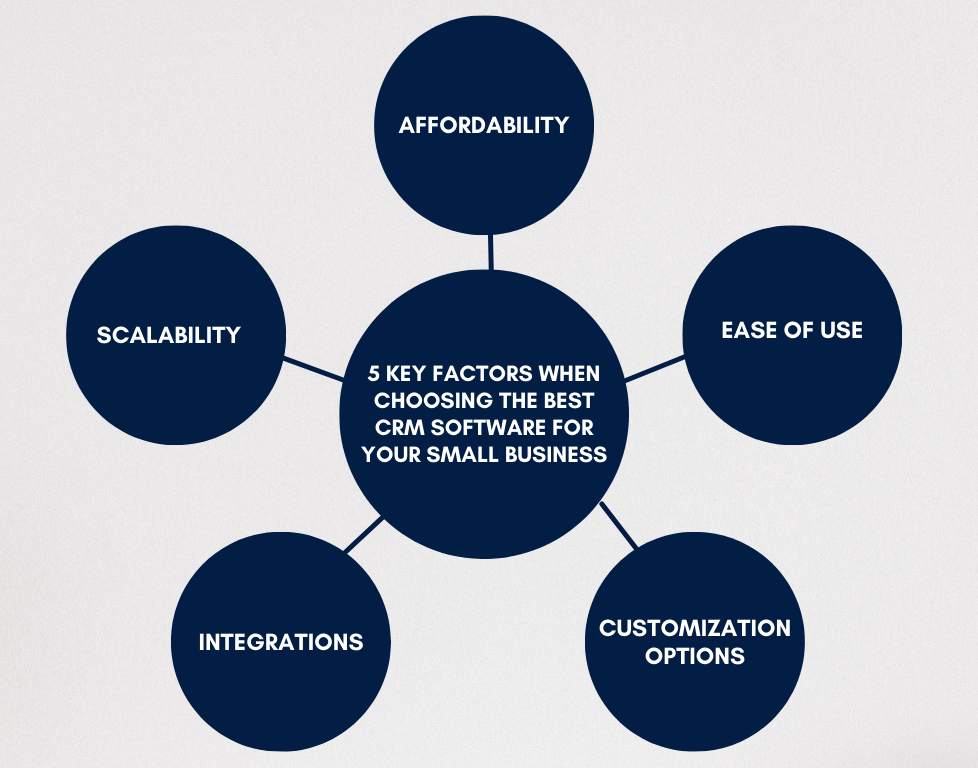
Choosing the right CRM software for small businesses can be a daunting task. There are many factors to consider, such as affordability, ease of use, customization options, integrations, and scalability. In this article, we will explore these five essential factors and how they can help you find the best CRM solution for your business.
Affordability: The Key to CRM Success for Small Businesses
One of the most important factors for small businesses is budget. You want CRM software that is affordable and fits your needs. However, affordability does not mean compromising on quality. You should look for CRM software that offers pricing plans tailored to small businesses, and that provides value for your money. You should also consider the potential return on investment (ROI) from the chosen CRM software. Consider how much can it help you increase sales, reduce costs, and improve customer satisfaction.
Ease of Use: Embrace Simplicity and Supercharge Productivity
Another key factor is the ease of use. You want CRM software that is user-friendly and easy to adopt. CRM software that has an intuitive interface and navigation can help you save time and effort. You don’t want to spend hours learning how to use the software or training your staff. You want to focus on building meaningful customer relationships and growing your business. A user-friendly CRM system can also enhance productivity and efficiency, as you can access and manage customer data with ease.
Customization Options: Craft Your CRM to Match Your Business’s DNA
Every business is unique, and so are your needs. You want CRM software that can adapt to your specific business processes and workflows. CRM software that offers customization options can help you tailor the data fields, workflows, reports, and dashboards to match your needs. You can also create custom forms, templates, and automation rules to streamline your tasks. By customizing your CRM software, you can align it to your business goals and strategies, rather than changing your business to fit the software.
Integrations: The Art of Seamlessly Connecting Your Business
Another factor to consider is integrations. You want CRM software that can seamlessly integrate with other essential applications that you use for your business, such as email marketing, accounting, invoicing, helpdesk, and e-commerce software. Integrations can help you streamline your business operations and improve data sharing across different platforms. You can also avoid data duplication and inconsistency by centralizing your data in one place. Integrations can also enhance customer experience by providing consistent and personalized service across different channels.
Scalability: Growing Strong with Your Business
Finally, you want CRM software that can grow with your business. As your business expands, so do your customer base and data storage needs. You want CRM software that can accommodate these changes without compromising on performance or security. You also want to avoid the hassle of switching platforms as your business grows, as this can be costly and time-consuming. You should look for CRM software that offers scalability options, such as upgrading plans, adding features, or migrating data.
In conclusion, choosing the right CRM software for small businesses can have a significant impact on your customer interactions, sales performance, and overall efficiency. By considering these five key factors: affordability, ease of use, customization options, integrations, and scalability, you can find the best CRM solution for your business. A well-chosen CRM software can help you build lasting customer relationships, increase sales revenue, reduce operational costs, and improve customer satisfaction.
Frequently Asked Questions (FAQ)
Q: Can CRM software help improve customer support?
A: Yes, CRM software can help improve customer support by providing a comprehensive view of customer data, such as contact details, purchase history, preferences, feedback, and issues. This can help you provide faster and more personalized support to your customers. You can also use CRM software to automate tasks such as sending follow-up emails, creating tickets, or assigning agents.
Q: Is cloud-based CRM software better for small businesses?
A: Cloud-based CRM software has many advantages for small businesses, such as lower upfront costs, higher security, easier updates, and greater accessibility. Cloud-based CRM software does not require installation or maintenance on your servers or devices. You only pay for what you use and access the software through the internet. Cloud-based CRM software also offers higher security measures than on-premise solutions, as the data is stored in encrypted servers with regular backups. Cloud-based CRM software also allows you to access and update your data from anywhere and on any device.
Q: How important is mobile access in CRM software?
A: Mobile access is very important in CRM software, especially for small businesses that have remote or field workers. Mobile access allows you to access and update your customer data on the go from your smartphone or tablet. You can also use mobile features such as geolocation, push notifications, or barcode scanning to enhance your customer service. Mobile access can help you stay connected with your customers and team members anytime and anywhere.
